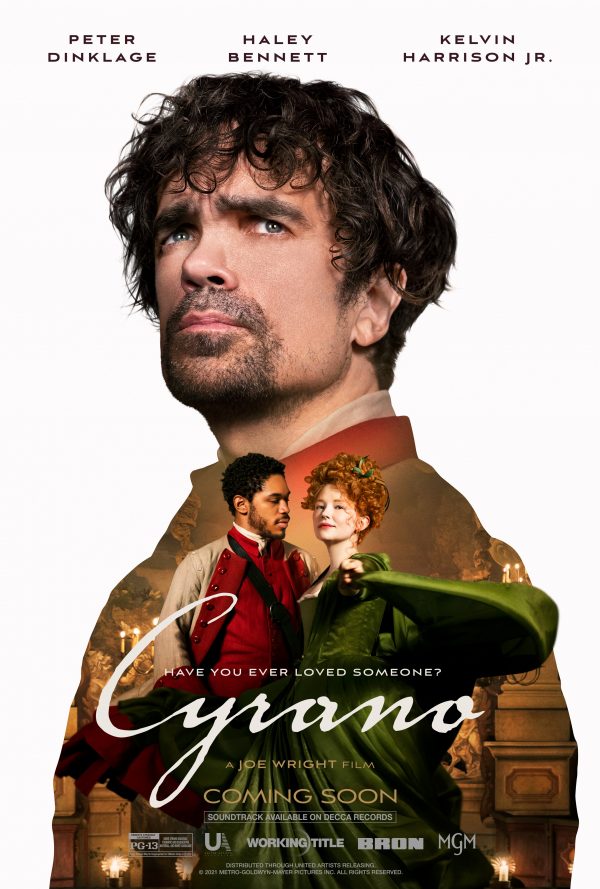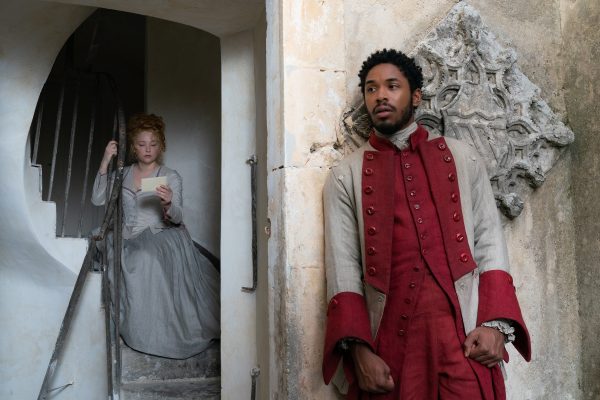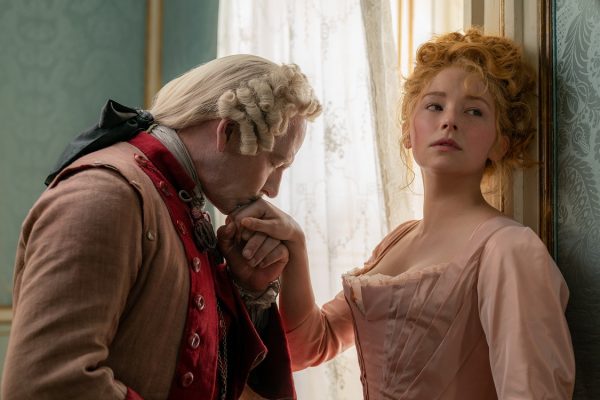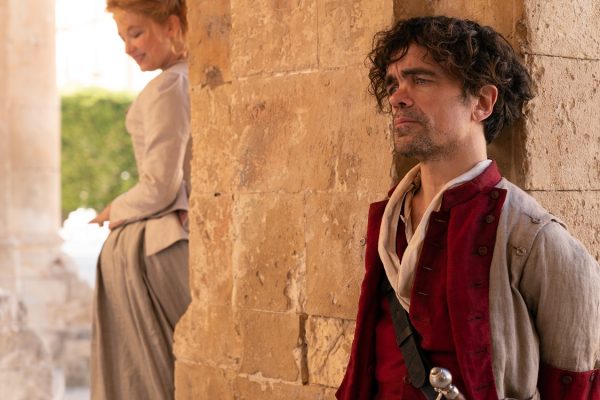
“Cyrano” (2021). Cast: Peter Dinklage, Haley Bennett, Kelvin Harrison Jr., Ben Mendelsohn, Monica Dolan, Bashir Salahuddin, Joshua James, Anjana Vasan, Ruth Sheen, Mark Benton, Peter Wight. Director: Joe Wright. Screenplay: Erica Schmidt. Plays: Erica Schmidt, Cyrano (2018), and Edmond Rostand, Cyrano de Bergerac (1897). Web site. Trailer.
Trite as it may sound, love is like food, something we need to live. It nourishes and sustains us, and it often makes life worth living. So, when we end up going without it, we generally feel starved. But what’s even worse is when we can see what we’re missing but unable to attain it, not unlike the ever-elusive unobtainable sustenance that tormented Sisyphus throughout eternity. Sentiments not unlike that provide the basis for a new take on a timeless classic, the musical adaptation of the stage favorite, “Cyrano.”
To love from afar is one of the most stirring scenarios in the world of romance. Unfortunately, it’s also one of most tragic. Such is the lot of 17th Century French swordsman and poet Cyrano de Bergerac (Peter Dinklage), who relentlessly swoons over his childhood friend, the fair Roxanne (Haley Bennett), pining away for her in woeful silence. Despite his great wisdom, his accomplished talents with the blade and his eloquence with the pen, he nevertheless believes he’s unworthy of love, especially that of someone so lovely as Roxanne. This is due to his diminutive stature, which is a constant source of ridicule and belittlement from a callous and uncompassionate society, one whose members frequently brand him as a freak. And, to compound matters, Cyrano keeps his feelings to himself, the only one to have a clue being his best friend and fellow soldier, Le Bret (Bashir Salahuddin).
Roxanne, meanwhile, has her own challenges. Having grown accustomed to leading a comfortable life, she needs to find ways to sustain that standard – not an easy feat when one is effectively broke. Marriage, it would seem, could help to solve that problem, and Roxanne is actively looking to fulfill that ambition but through a perfect storybook romance. However, as Roxanne’s chaperone and household companion, Marie (Monica Dolan), so pointedly observes, money is what Roxanne needs, something that often doesn’t accompany amour. So, when dates are arranged for her with moneyed suitors like Viscount Valvert (Joshua James) or the powerful Duke de Guiche (Ben Mendelsohn), Roxanne goes along, albeit begrudgingly. Those circumstances become ever more complicated when Roxanne catches a passing but heart-stopping glance of a handsome young military recruit, Christian de Neuvillette (Kelvin Harrison Jr.), who simultaneously melts at the glimpse of the fair maiden. It’s kismet, to be sure.

As Roxanne falls for the man in uniform, Cyrano concurrently resolves to finally tell her how he feels. He arranges a rendezvous to profess his love, a meeting at which she simultaneously seeks to confess her attraction for Christian. And, when her secret surfaces, Cyrano is heartbroken, especially when she seeks advice on how she might be able to meet her new love. Indeed, the tragedy thickens.
When cadet de Bergerac encounters cadet de Neuvillette at their military compound, Christian informs Cyrano of his love for Roxanne, an attraction that the lovelorn soldier confirms is mutual. That revelation leaves Christian overjoyed but in a dilemma – as one who is frequently lost for words in adequately expressing himself, he wonders how he’ll ever be able to charm the object of his desire. Upon learning that Cyrano has a way with words, Christian asks him for his help in feeding him the requisite prose for winning over Roxanne’s affections, a proposal to which he agrees. And so, through a series of love letters and heartfelt soliloquies, Christian makes “his” feelings known to Roxanne, a development that leaves Cyrano forlorn save for whatever vicarious satisfaction he might derive from his secret assistance.
But will Roxanne and Christian live happily ever after? With a distant war raging and French fortunes in that conflict quickly fading, the new recruit may soon find himself on the front lines of a battlefield where the prospects of victory are looking increasingly bleak. Then there’s Duke de Guiche, who’s placing increasing pressure on Roxanne to wed him or face unpleasant consequences. And, through it all, Cyrano is left to sit back and watch, unable to express his feelings or unburden himself of the painful secret he carries. What impact will these conditions have on all involved? Will romance survive under these circumstances? And, if so, in what form?
Poor Cyrano. His tragic circumstances ooze melancholy and despair. One can’t help but feel for him, especially since it seems that he’s destined to live out his life in perpetual solitude. He’s obviously sincere in his feelings, but he seems unable to do anything about them.

To be honest, though, he’s also been unwilling to do anything about his situation. Granted, he would have his hands full if he sought to do so, but that’s not to say his circumstances are unchangeable. After all, as the old saying goes, “It’s better to have loved and lost than to have never loved at all,” and that’s something Cyrano has yet to put to the test. And who knows – things might even work out.
How could Cyrano address this? Well, he could start by examining and seeking to alter his beliefs, for they provide the basis of the conscious creation process, the philosophy that maintains we draw upon these resources in shaping the nature of our existence, for better or worse. That’s an especially crucial notion when it comes to something as fundamental as manifesting what makes us feel happy and fulfilled, and romance is often at the heart of that. But Cyrano’s beliefs have kept that goal at bay, primarily because he doesn’t believe that he’s deserving of something so essential as love. In essence, Cyrano keeps getting in his own way. He allows the insults hurled at him to color his view of himself, and that keeps him stuck in place. But must he stay that way?
Changing our beliefs is the starting point when it comes to changing our lives. For instance, instead of looking upon the mockery and scorn thrust upon him as a source of hindrance, he could consider viewing it as a source of motivation, one that galvanizes him in his efforts to succeed at achieving his goal and silences the naysayers who contend he’ll fail or isn’t worthy of what he seeks. He’s clearly demonstrated his aptitude at becoming skillful at activities that someone of his stature shouldn’t be adept at, such as his swordsmanship. He’s also become quite accomplished at expressing romantic thoughts for someone who has no relationship experience. So why shouldn’t the same be true when it comes to surmounting a challenge like attaining success at love?
This is a classic case of seeing the glass as half empty or half full. But it’s a situation that won’t change on its own; Cyrano has to deliberately want to invoke it through his own efforts, starting with his beliefs. The question, of course, is, will he?

One could argue that Cyrano’s efforts in this area are especially important given that his feelings for Roxanne are as plain as day, even if he hasn’t expressed them to anyone other than Le Bret. His desire for a loving relationship with Roxanne is indeed earnest, a reflection of his true self. It’s a desire infused with a potent degree of personal integrity. Yet he fails to follow through on it, and his lack of integrity on this point completely undermines the possibilities that are open to him if only he’ll allow them.
The result of this, of course, is regret. It validates the fact that the chances we don’t take are often more painful than the ones we do. And no amount of rationalization or settling for vicarious experiences will make up for this, as they inherently pale by comparison. That only serves to compound the pain and anguish we experience, making our tragedies that much more profound. And, unless Cyrano is willing to do something about that, it’s the destiny that unfortunately awaits him.
This is also a classic case of understanding that we must accept responsibility for what we create. As difficult as that may be, it’s how things work when it comes to materializing our reality, and, as this scenario illustrates, there are consequences associated with our beliefs and actions. One might be able to overlook the tragedy in something like this if it’s embarked upon with a willing blind eye, but that’s significantly harder to do when it’s approached with full awareness of what will ultimately unfold. Under circumstances like that, can any of us say that we would have anyone to blame but ourselves?
There are steps we can take to avoid such pitfalls. As noted earlier, changing our beliefs is a key first step, especially when it comes to addressing matters of fear and limitation. These issues are clearly holding Cyrano back, and he seems to understand that. But what is he doing to change the game? Not much, apparently. And that’s where some of the most profound sadness enters in this story. It really becomes an exercise in “…if only,” and that, unfortunately, can be one of the most frustrating and painful outcomes any of us could experience, truly a cautionary tale for the ages.

Conveying feelings of true love accurately and believably is a tall order, to be sure, and director Joe Wright’s musical adaptation of the stage classic Cyrano de Bergerac sometimes misses the mark. However, this lavish period piece production hits the target more often than it doesn’t, providing diehard romantics with a generally satisfying movie outing when it comes to exploring the themes of longing and unrequited love. The unfairly criticized musical numbers add a light, airy touch to this story, and, even though they may not be the most memorable compositions in the history of this genre (what musicals are these days?), they’re certainly inoffensive and enjoyable enough to merit their inclusion. What’s most gratifying about this picture, however, is its fine cast with admirable performances by Bennett, Harrison, Mendelsohn, and, most notably, Dinklage, who absolutely steals the show. “Cyrano” may not qualify as great cinema, but it’s fun, heartrending and easy on the eyes, and there’s nothing wrong with a film that can successfully pull that off.
For its efforts, the film garnered considerable acclaim during the recently completed awards season, especially in technical areas. The picture earned an Oscar nomination for best costume design, an accomplishment matched in the BAFTA Awards competition, where it also earned nods for achievements in hair/makeup and production design, as well as accolades for best British film. The performance of Peter Dinklage was also recognized as a stand-out, capturing nominations for best actor in the Critics Choice and Golden Globe Awards, along with a Globe nod for best musical/comedy picture.
As we all come to discover at some point in our lives (or at least one would so hope), life passes us by too quickly to intentionally deny ourselves that which we want or need, and love is at the top of the list. It’s so sad to see so many longing for what’s missing, especially when we can take steps to attain it, if we only allow ourselves to do so. “Cyrano” shows this to us in hopes that we can avoid such a heartbreaking fate – and find what we’re looking for while we still have the chance.
Copyright © 2022, by Brent Marchant. All rights reserved.

No comments:
Post a Comment